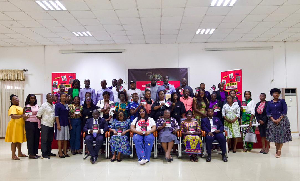Ufeministi Anyidado for Vulnerable Women and Children is a Non-Profit Organization(NGO) has organized a training workshop on preventing and responding to sexual harassment and Gender-Based Violence (GBV) at workplaces.
The workshop, which took place today, focused on equipping Human Resources leaders with the necessary knowledge, tools, and strategies to foster safe and respectful work environments.
Our primary aim of the NGO includes promoting the rights of women and children and helping to combat Gender-Based Violence in Ghana.
In her opening remarks, Mrs. Marina Carmen Kelly, Executive Director of Ufeministi Anyidado, highlighted the significance of the recently signed Affirmative Action Bill by Parliament.
"The historic signing of the Affirmative Action Bill by Parliament marks a significant milestone in our journey towards gender equality," Mrs. Kelly stated.
"This legislation paves the way for a more inclusive and equitable society, and we must ensure its effective implementation in our workplaces."
Mrs. Kelly emphasized the pivotal role HR practitioners play in creating a culture of zero tolerance towards SGBV and supporting survivors.
"As HR leaders, you play a vital role in creating safe and respectful work environments. This workshop is designed to equip you with the knowledge, tools, and strategies to prevent and respond to SGBV, promoting a culture of zero tolerance and support for survivors," she said.
"Let's work together to create workplaces where everyone can thrive, free from fear of violence and discrimination," Mrs. Kelly urged the attendees. "Thank you for your commitment to this ideal. Let’s make a meaningful impact, starting today."
Addressing a gathering participants, Lawyer Alex Nartey Esq. stressed that issues of sexual harassment are contemporary democratic and human rights concerns, and the active participation of HR managers is crucial in mitigating these challenges.
Mr. Nartey underscored the importance of a holistic approach in managing sexual harassment, which should encompass law, ethics, professionalism, culture, and values.
He also addressed the misconception that Ghana lacks sufficient legislative measures to tackle sexual harassment, urging HR practitioners to recognize the existing provisions and take proactive steps.
"The legislative framework that we need to enable us to do what is expected of us does not need to be explicit. It only needs to establish enabling grounds for the HR practitioner who is actually the key stakeholder in managing this to navigate into efficient management of the issue at hand," Mr. Nartey explained.
He cited various constitutional articles, including Article 17 and Article 18, which, though not explicitly mentioning sexual harassment, provide the foundation for interventions against it.
Highlighting the societal attitudes and cultural norms that complicate the issue, Mr. Nartey called for a shift in perception and greater responsibility among individuals.
He pointed out the need for empathy and understanding of the dynamics between genders, particularly in the context of sexual behavior and harassment.
Mr. Ebenezer Korli, a clinical psychologist, also addressed participants on the profound effects of sexual and gender-based violence (SGBV) at an event organized by Ufeminisiti.
Drawing from his extensive experience working with vulnerable groups, Mr. Korli provided a comprehensive overview of the physical, emotional, and cognitive repercussions of SGBV.
Mr. Korli emphasized the multi-faceted impact of SGBV on individuals, noting significant health challenges as a primary concern.
"Victims of abuse often mask their health issues, leading to recurrent health problems that are difficult to diagnose and treat," he explained.
He also highlighted the potential for SGBV to trigger pre-existing mental health conditions. "Abuse can exacerbate underlying issues like depression, anxiety, and social phobias, severely affecting a person's ability to function in their daily lives," Korli said.
He underscored the necessity of creating safe and confidential spaces for victims to share their experiences without fear of repercussions.
He stressed the importance of professional psychological support in workplaces to navigate these complex situations effectively.
A rape survivor who also shared her story described the intense trauma and mental strain that followed.
"It wasn't easy. It was tough, and if you don't take care, you might get a mental problem because every time you think about it, you feel like committing suicide," she said.
Despite the pain, she found a glimmer of hope in her child, born when she was just 15 years old. The birth brought mixed emotions—pride and happiness, coupled with societal stigma.
"People will be like, why are you giving birth to a teenager? And they will mock you. But I didn't give up because I said to myself, I wanted to be someone," she explained.
Reflecting on the support system that aided her recovery, she emphasized the importance of parental support.
"Parents should embrace their children when something like that happens. You have to just talk to your child. Let her pick her pieces together," she advised.
General News of Thursday, 1 August 2024
Source: www.ghanaweb.com













